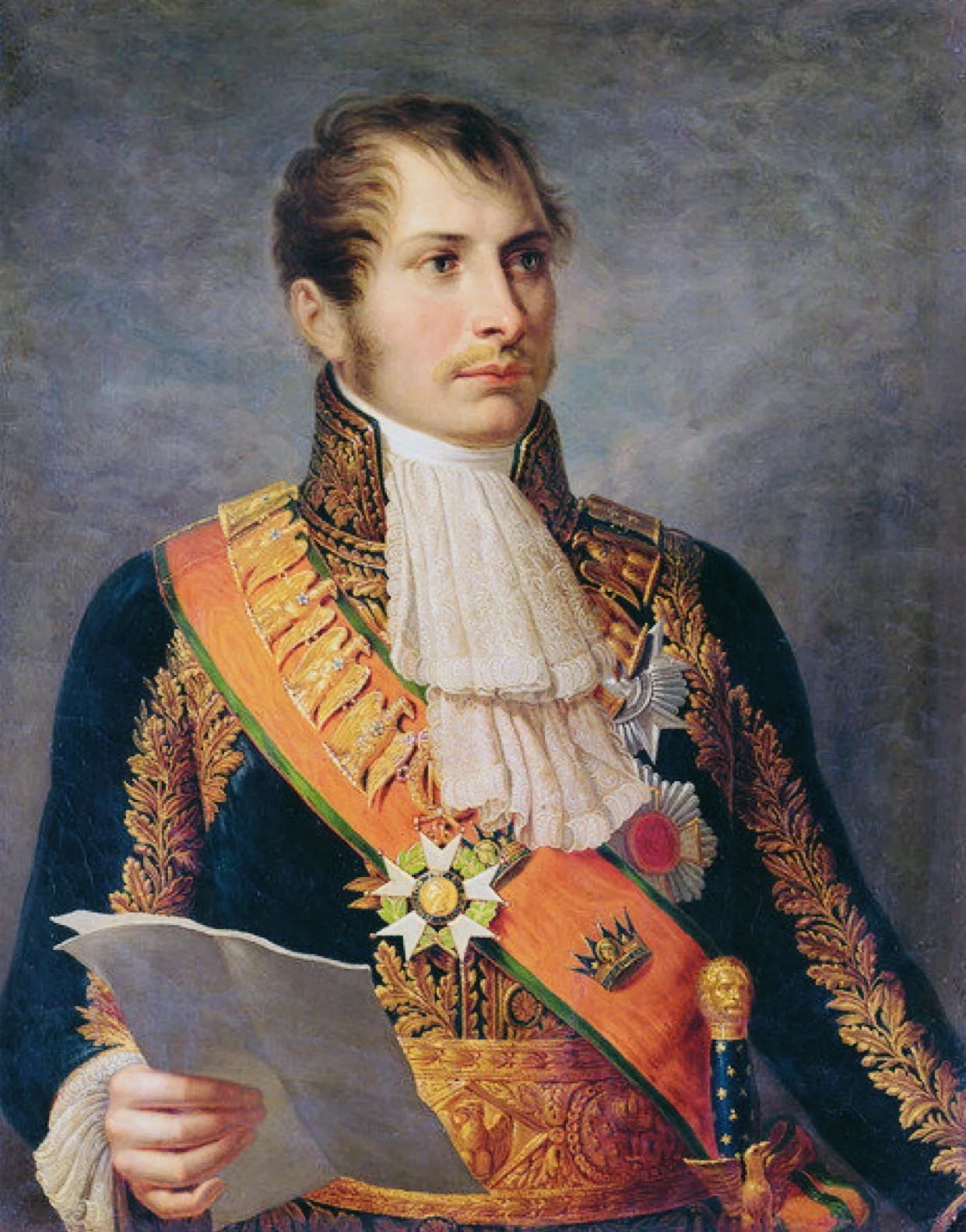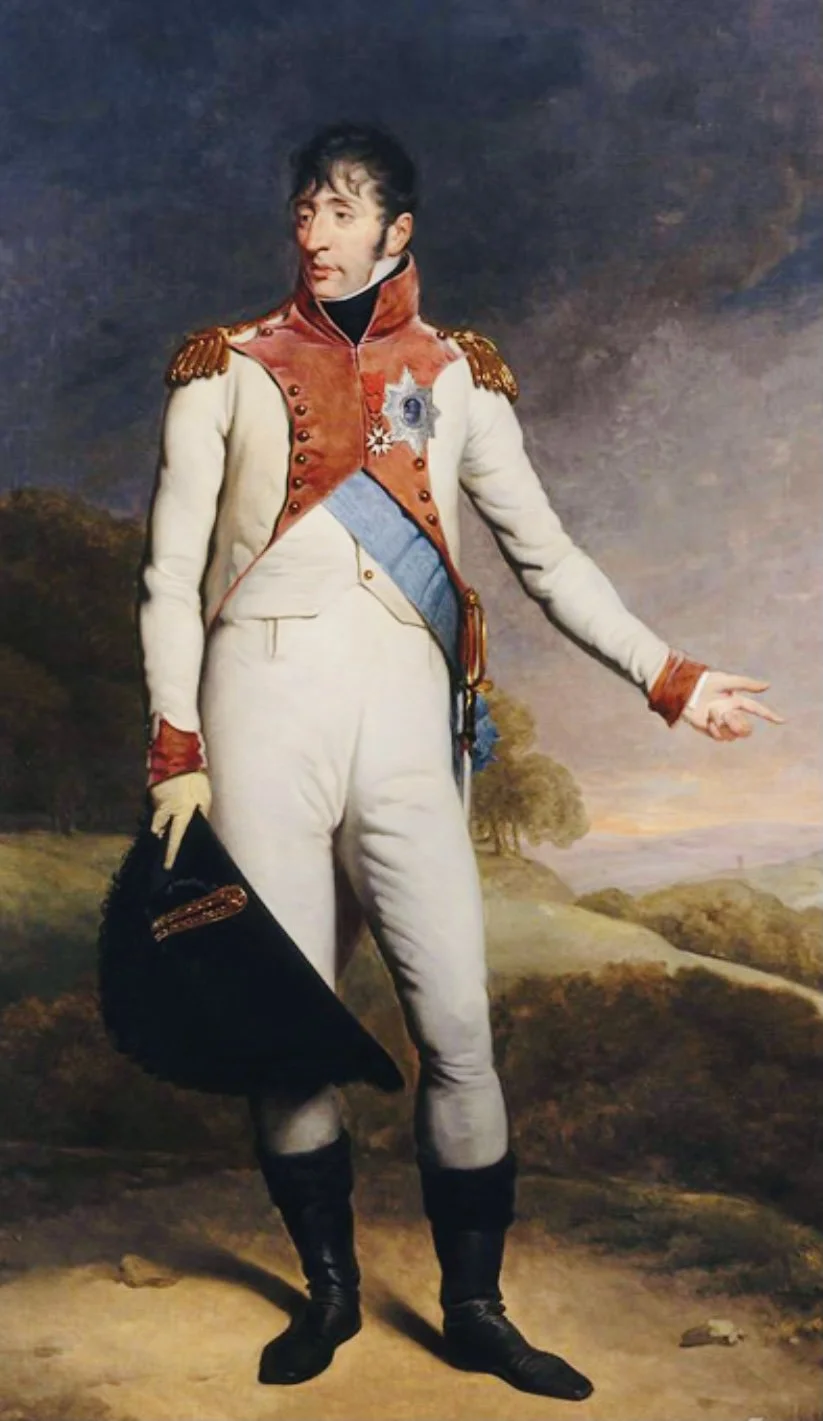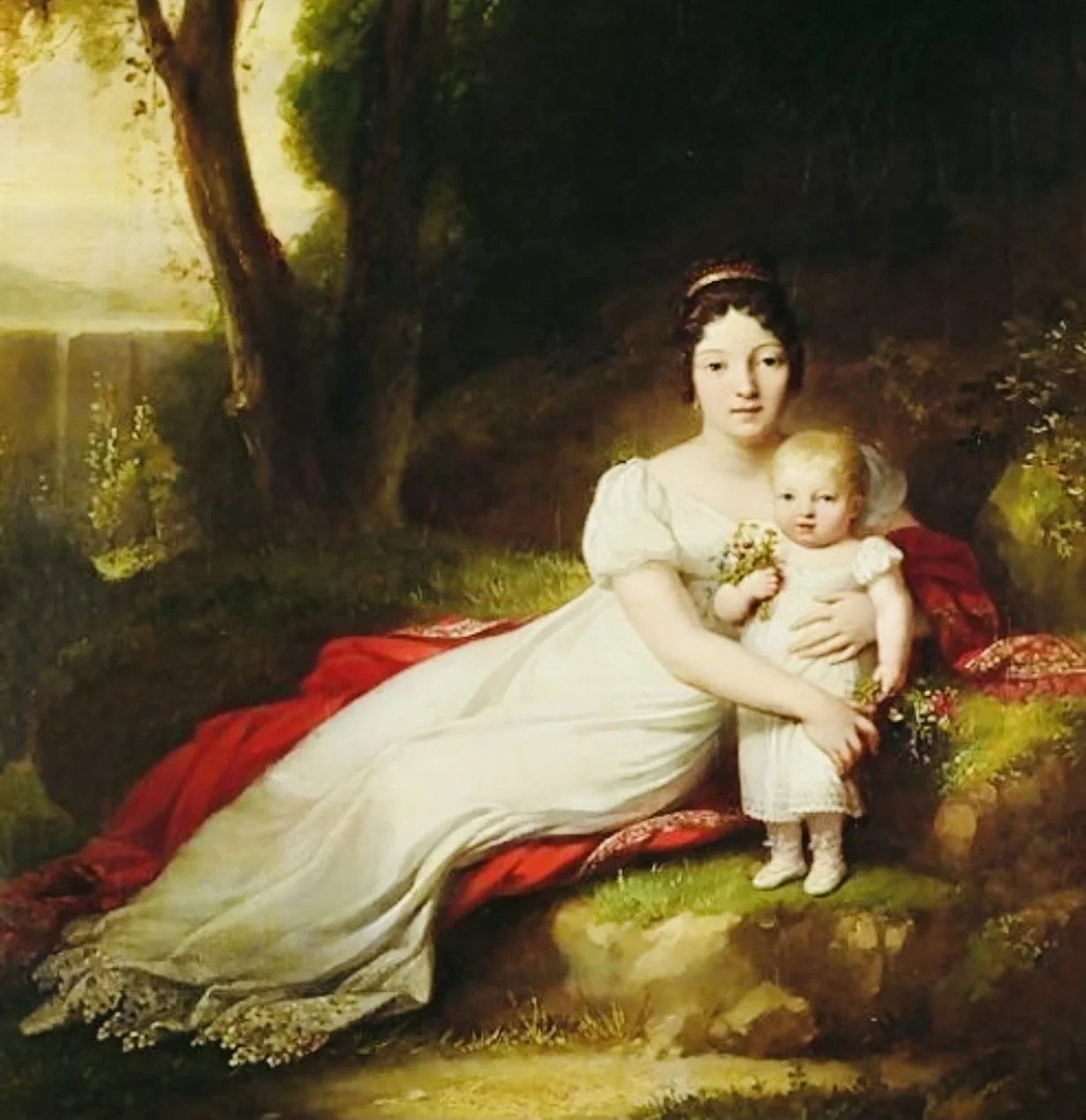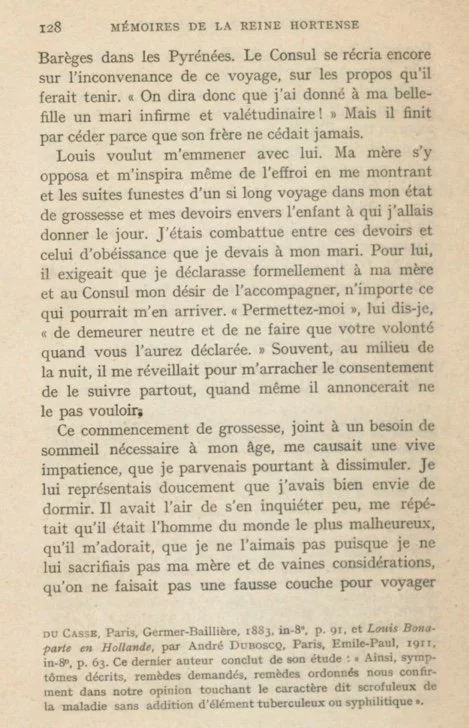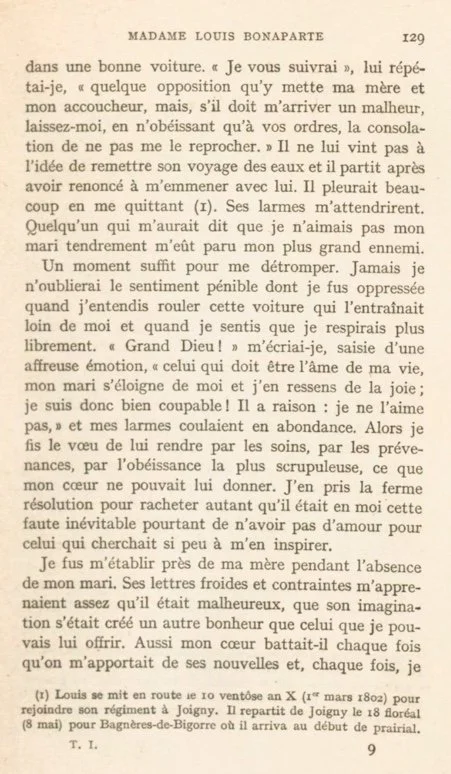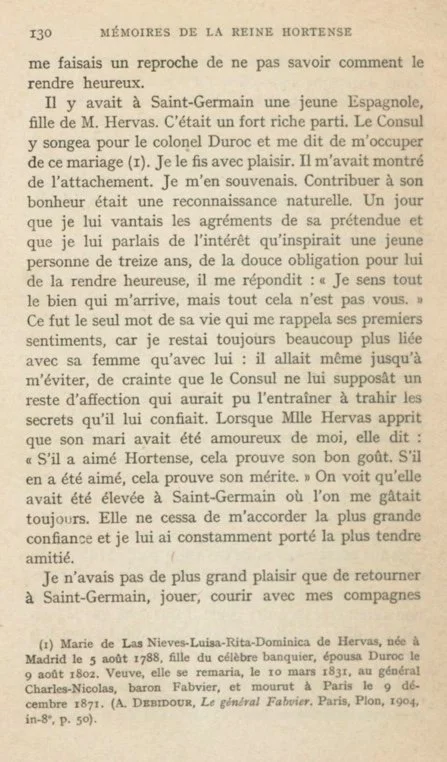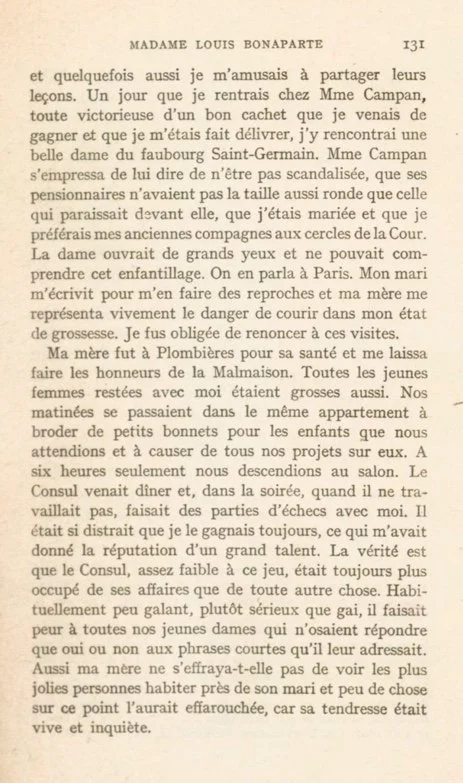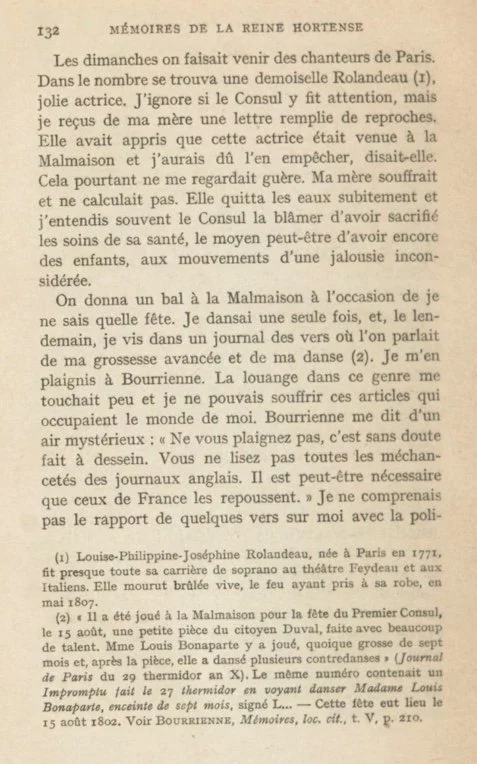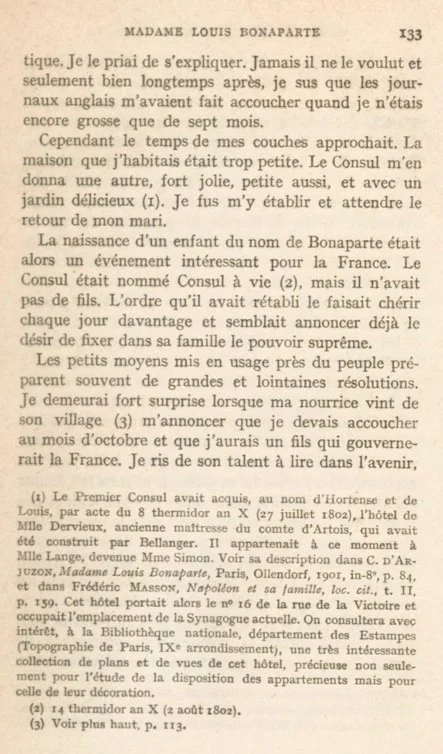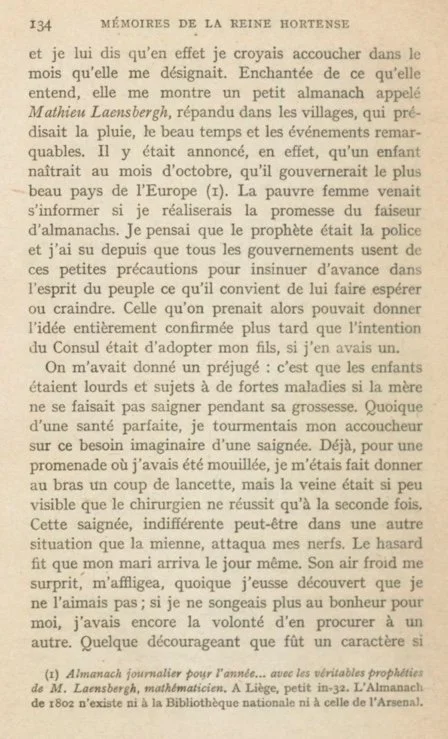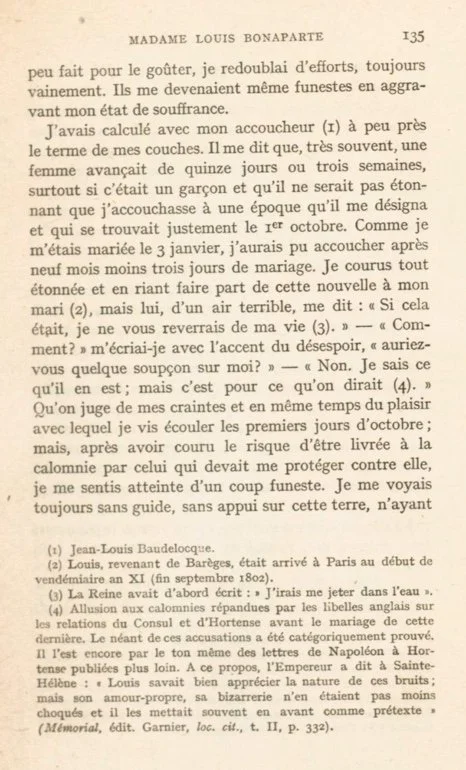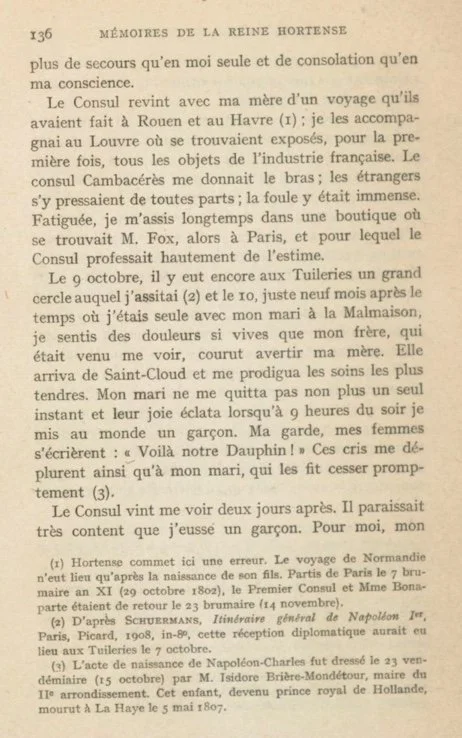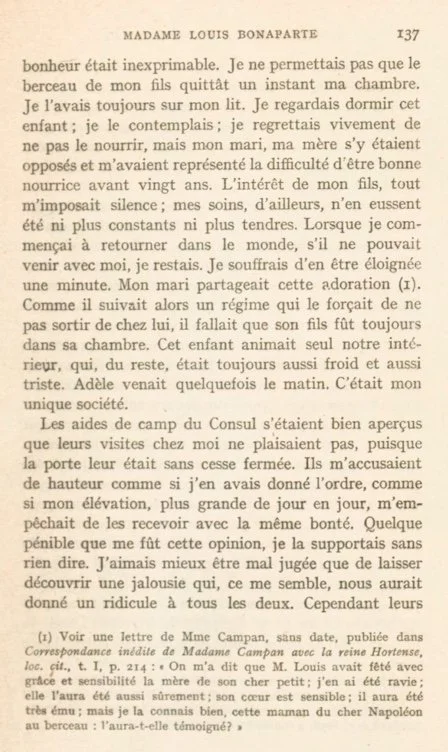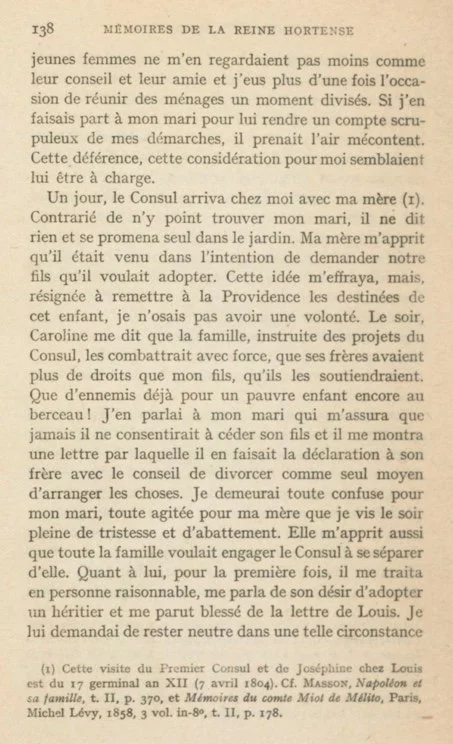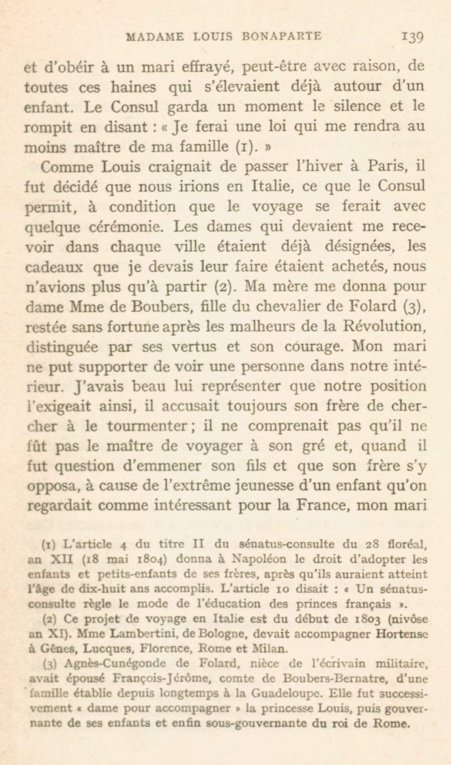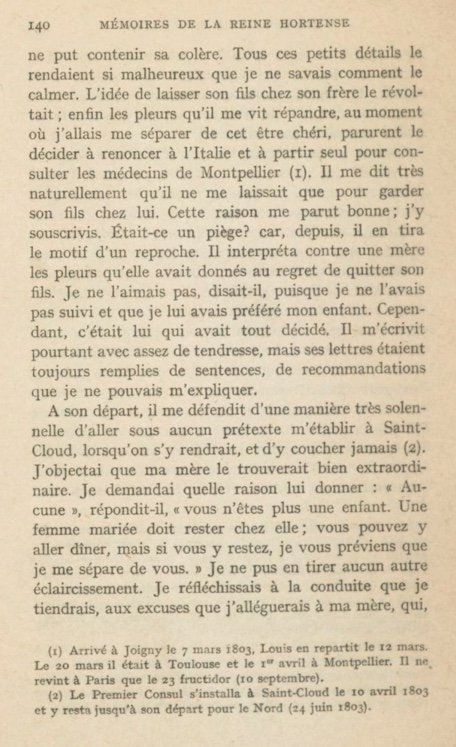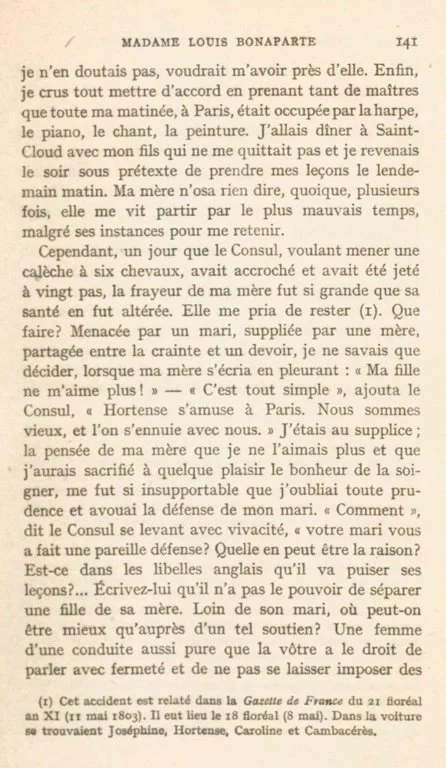Let’s have another look at Hortense’s Memoirs. If you want to read the book it is available for free at the side bar in English and French. Use the widget on the sidebar to translate the text below into pretty much any language.
In this excerpt, Hortense watches her husband start to descend into a jealous madness.
Frequently he [Louis] woke me [Hortense] up at night to make me promise to follow him everywhere, even though he might declare he did not wish me to do so. My state of health and the need of sleep, natural in a person of my age, caused me to become extremely impatient with him on these occasions, although I did my best to conceal the fact.
I pointed out to him gently that I was anxious to go to sleep. He did not pay much attention to this but kept on declaring that he was the unhappiest man in the world, that he adored me, that I evidently did not care for him as I refused to sacrifice my mother and my foolish ideas to him, that a woman does not have a miscarriage if she travels in a comfortable conveyance.
I will follow you," I told him, "no matter what my mother and my doctor say, but should a misfortune occur at least let me have the consolation that it was a result of your orders, not through any fault of my own."
It never occurred to him to postpone his trip to Bareges and he left after having given up the idea of taking me with him. He wept freely when he bade me good-bye. I was touched by his tears. Anyone who at that moment had said to me that I did not love my husband dearly would have seemed to me to be an enemy of mine. But a moment was enough to show me the true state of my feelings. I shall never forget the painful sensation I had when I heard the carriage roll away that was taking Louis from me; I felt I was breathing more freely.
“Great heavens," I exclaimed overcome with anguish, "the man who should be the soul of my soul, my husband, is leaving my side, and I am delighted! How guilty such a feeling is ! He is right, I do not love him." I burst into tears. As I did so I vowed that by my care for his comfort, my thoughtfulness on his behalf, by the most scrupulous obedience to his wishes I would try to make up to him for those sentiments my heart could not feel toward him.
I finally resolved to redeem as far as was in my power my crime, inevitable though it was, of not loving the man who did so little to arouse my sentiment.
During my husband's absence I stayed with my mother. My husband's cold and constrained letters showed me clearly enough he was unhappy, that his imagination had created a vision of happiness different from any I was able to offer him. Each time word came from him my heart beat violently, and each time I reproached myself for not knowing how to make him happy.
At the time a young Spanish girl was at school at Saint Germain. She was the daughter of Monsieur Hervas and would inherit a great fortune. The Consul had thought of a marriage between her and Colonel Duroc and told me to arrange matters. I was delighted to do so. Duroc had once shown he cared for me and I had not forgotten the fact. To help him be happy was a sign of my gratitude. One day when I was describing Mademoiselle Hervas' merits to him and speaking of the interest a young girl of thirteen inspired and how delightful a task it must be to make life pleasant for her he replied, "I realize my good fortune, but all of that does not console me for having lost you." This was the only word he ever uttered which reminded me of the past. In fact, I saw much more of his wife than I did of him. He always seemed to avoid me, fearing perhaps that the Consul might think that his affections for me would tempt him to betray the secrets which were confided to him.
Napoleon validated on St. Helena that Duroc was a man of hidden passion.
When Mademoiselle Hervas was told that her husband had been in love with me, she said: "If he loved Hortense, that proves his good taste. If he had been loved by her that would have proved his merits." Her remark shows that she had been brought up at Saint Germain where everyone spoiled me. She never ceased to trust me implicitly, and I always felt strongly attached to her.
My greatest pleasure was still to return to Saint Germain to play and run about with my schoolfellows and sometimes even share their lessons. One day when I entered Madame Campan's room, proud of a prize I had just won, which I insisted on taking with me, I encountered one of the fashionable beauties of the aristocratic Faubourg Saint Germain. Madame Campan hastened to assure her that there was no need to be scandalized, that her other boarders did not have the more than matronly figure I possessed, that I was duly married but preferred the society of my former schoolfellows to the formal receptions at court. The noble dame could not hide her astonishment and failed to understand such childish tastes. The incident was talked about in Paris.
My husband wrote me about it and found fault with my behavior, while my mother lectured me on the danger of running about in such fashion in my condition. I was obliged to give up my visits to school.
Mother went to Plombières for her health and left me to do the honors at Malmaison. All the young ladies who were staying there at the time were also expecting babies. We spent our mornings sitting together embroidering bonnets for the children we were about to have and talking about our plans for them. We did not go downstairs to the drawing-room till six o'clock. The Consul would come to dinner and in the evening, when he was not working, would play chess with me. He was so absent-minded that I always won, thereby acquiring a reputation of great skill. As a matter of fact, the Consul, not particularly good at chess, was always thinking more about other things than about the game. Usually not particularly courteous, serious rather than gay, he frightened all our young ladies, who only dared answer yes and no to the curt sentences in which he addressed them.
For this reason, my mother, although highly susceptible, was never alarmed by the idea that her husband was surrounded by pretty women.
On Sundays, singers would come out from Paris. Among them was a certain Mademoiselle Rolandeau, a pretty actress. I do not know whether the Consul paid any attention to her, but I received a letter from my mother filled with reproaches. She had heard, she said, that this actress had come to Malmaison. I should not have allowed it. Yet what did that have to do with me? My mother was hurt and did not weigh her words or acts.
She suddenly left Plombières where she was taking the cure, and I have often heard the Consul blame her for having sacrificed the care of her health, the possibility perhaps of having children, to an impulse of ill-considered jealousy.
A dance was held at Malmaison for some holiday or other. I only danced once. The next day I saw in a newspaper verses describing my state of health and my dancing. I complained to Bourrienne about it. Praise under such circumstances was unwelcome to me, and disliked intensely those articles which told the public what I was doing. Bourrienne answered mysteriously, “Do not complain; it was probably printed on purpose. You have no idea of the despicableness of the English papers. It was perhaps necessary for the French press to refute them."
I failed to see the connection between some verses about me and the political situation. I begged him to explain. He refused to do so. It was not till long afterwards I found out that the English newspapers had declared I had been delivered of a child when I was only in my seventh month of pregnancy.
Meanwhile the time for the birth of my child drew near. The house I was living in was too small. The Consul gave me another one, very charming, also rather small and with a delightful garden. I moved in and awaited the return of my husband.
The birth of a child bearing the name of Bonaparte was an event of considerable interest to all of France. The Consul had been appointed Consul for life, but he had no son. The fact that he had restored order increased his popularity throughout France and seemed already to indicate on the part of the public a desire to invest the supreme power in his family.
Little means are frequently employed to prepare the public for important changes that are still far in the future. I was greatly surprised one day when my nurse came from her village to tell me that my child would be born in October and that a son of mine would someday rule over France. I laughed at her skill as fortune-teller and told her that as a matter of fact I did expect to become a mother in October. Delighted with the news she showed me a little almanac called "Mathieu Laensbergh," widely read in the country districts, which predicted the changes of the weather and notable events that would take place. According to this almanac a child would be born in October who would reign over the greatest country in Europe. The poor old woman had come to find out if I was about to fulfil this prophecy. I thought it likely that the prophet was a member of the secret police and I later learned that all governments use these humble means to create in people's minds impressions of one kind or another. The maneuver in the present instance would later fit in with the announced intention of the Consul to adopt my son if I had one.
I had one preconceived opinion in regard to my health; namely, that unless a mother was bled during her period of pregnancy the child was apt to be sluggish in temperament and liable to catch serious diseases. Although in perfect health I kept bothering my doctor insisting on the need of this bleeding. Already, after a walk where I had been caught in the rain, I had had an incision made in my arm with a lancet, but the vein was so faintly visible that the surgeon had been obliged to make two incisions. This blood-letting, which might have proved harmless at another time, affected my nerves. As chance would have it my husband returned the same day it took place.
His unfriendly attitude upset me and made me unhappy. Though I was aware of the fact I no longer loved him, though I had already given up all hope of being happy myself, I still wished to make him happy, in spite of his far from optimistic character. I redoubled my efforts to achieve this end. All proved fruitless. Moreover, they did me harm in still further affecting the state of my health.
Eugene de Beauharnais.
With my doctor I had calculated the moment when my child should be born. He told me that women often made mistakes of two and even three weeks, especially if it was a boy, that he would not be surprised if the event took place at a date he mentioned and which was about the first of October. As I had been married the third of January this would have made just three days less than nine months after my marriage. Greatly surprised and amused I hastened to tell this to my husband, but he replied gloweringly, "If such a thing happened, I would not see you again as long as I lived."
“What," I exclaimed in despair, "can it be that you suspect me?"
“No, I know the truth. But it is on account of what people would say."
Imagine my fears and at the same time the delight with which I saw the first few days of October slip by. Although I was relieved of the fear of being publicly shamed by the man who should have been my natural protector, I suffered cruelly from his attitude. I felt that I was alone, deprived of any comforter on earth, with no source of help but such as I could find in my own heart, no other consolation except what my conscience was able to give me.
The Consul returned with my mother from a trip they had taken to Rouen and Havre. I went with them to the Louvre where there was an exposition, the first of its kind, of all the articles produced by French industry. The Consul Cambaceres gave me his arm, many foreigners were present and the crowd was very great. Easily tired I sat for a long while in one of the stalls where Monsieur Fox, who was just then in Paris, happened to be. The Consul had a great regard for this statesman.
The ninth of October was another large reception at the Tuileries. I attended it and on the tenth, just nine months after the date on which my husband and I withdrew to Malmaison was seized with such intense pains that my brother, who had come to see me, hurried off to get my mother. She arrived at Saint Cloud and took the tenderest care of me. Nor did my husband leave my side. Both were overjoyed when at nine o'clock in the evening I gave birth to a boy.
Louis Bonaparte.
My nurse and my attendants exclaimed "Look at our Dauphin." My husband did not like these exclamations and had them immediately silenced. He appeared much pleased that the child was a boy. Two days later the Consul came to see me. As for me my joy was inexpressibly intense. I did not allow my son's cradle to be taken out of the room for an instant. I always kept him on my bed. I looked at the sleeping child; I hung over his slumbering form. I regretted bitterly not being able to nurse him, but my husband and mother both opposed my wishes, pointing out how difficult it was to nurse a child before one was twenty. The welfare of my son must take precedence over everything. Indeed, had I been his nurse, I could not have tended him more constantly, more tenderly than I did. When I was well enough to get up again, if he was not able to go out, I stayed at home. I was unhappy the moment he and I were separated. My husband worshiped him as much as I did. As he was following a treatment just then that did not allow him to go out, the child was obliged to be always in his room. The baby was the only bright spot in our home, which otherwise was as bare and cold as ever. Adele came occasionally to see me in the morning. She was my only companion.
The Consul's aides-de-camp had of course noticed that their visits to me were not welcome from the fact they were always told I was not at home. They accused me of being over proud, as though I were responsible for this state of things; they considered that it was my position, which was daily becoming more important, which prevented me from receiving them with as much friendliness as I had done previously. However painful such an opinion was to me I bore it well enough. I preferred to be misjudged rather than reveal to others a jealousy which, so it seemed to me, would have made both my husband and me look ridiculous. Nevertheless, the officers' young wives still looked on me as a friend and advisor, and on several occasions, I reunited husband and wife who were temporarily estranged.
If I told my husband about these things in order to keep him informed of everything I was doing, he looked displeased. The deference, the consideration in which. I was held were disagreeable to him.
Once the Consul called with my mother. Annoyed at not finding my husband at home he said nothing and walked about alone in the garden. My mother informed me that he came intending to ask for our son, whom he intended to adopt. This idea startled me but being prepared to trust the future of our child to Providence I dared not formulate any objection. In the evening Caroline told me the rest of the Bonaparte family on being informed of the Consul's idea had opposed it vigorously, declaring that his brothers had more claim to succeed him than my son and that they were prepared to defend these claims.
How many enemies already arrayed against a poor child still in its cradle! I spoke of this to my husband, who assured me he would never give up his son. He showed me a letter in which he announced this to the Consul, at the same time advising the latter to obtain a divorce as the only means of arranging matters. I felt worried about my husband, perturbed about my mother, who that evening looked sad and downhearted.
She, also, told me that all his family were advising the Consul to repudiate her. The Consul for the first time treated me like a grown-up person, spoke to me about his wish to adopt an heir and seemed hurt at my husband's attitude. I asked him not to oblige me to take sides on such a question and to allow me to obey a husband who was perhaps justly alarmed to see so much antagonism centering about his child. The Consul said nothing for a moment, then broke the silence with the remark, "I shall pass a law that will give me authority over my family."
As Louis feared to spend the winter in Paris on account of his health, it was decided we should go to Italy. The Consul gave his consent to the plan on condition that our journey take place with a certain amount of state. The ladies who were to receive me in each town had already been chosen, the gifts I was to make them had already been bought, the moment of our departure had come. My mother had chosen as my lady in waiting Madame de Boubers, daughter of the Chevalier de Folard, who lost her fortune in the Revolution. She was noted for her courage and her high moral standards. My husband detested having anyone stay with us. It was useless for me to point out to him that our social position made this inevitable.
He constantly accused his brother of wishing to annoy him; he could not understand why people should not be allowed to travel as they pleased. When the question of taking his son with us came up, and the Consul objected to it on account of the child's extreme youth, Louis was unable to restrain his anger. All these petty trifles made him so unhappy that I did not know what to do to pacify him. The idea of leaving his son in the care of his brother excited him violently.
Finally, the tears he saw me shed, as the moment approached. when I should be separated from the child I loved so dearly, seemed to make him decide to give up the trip to Italy and instead go to Montpellier alone in order to consult the physicians there. He explained to me in an entirely natural manner that he was only leaving me behind in order that his son should not leave home. The reason seemed a good one to me. I accepted the suggestion. Was this intended as a trap? Later he reproached me for it. He misinterpreted the tears a mother shed at the thought of leaving her son. He declared it was clear I did not love him since I had not accompanied him, but had preferred to stay with my child.
Yet it was he who had proposed this arrangement. Nevertheless, he wrote affectionately enough, but his letters were full of sentences, of pieces of advice, which I could not understand. When he was leaving, he forbade me very solemnly to go to live at Saint Cloud under any pretext when the Consul and my mother went there, and never to stay there overnight. I objected that my mother would find such conduct rather extraordinary and asked what excuse I could give for it.
“You have no reason to give an excuse," he replied.
"You are no longer a child. A married woman should stay at home. You can go and have dinner there, but if you spend the night, I warn you I will divorce you."
The original French is available below:



